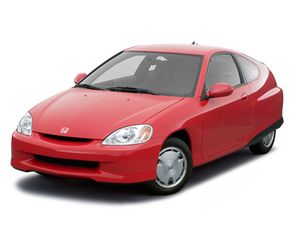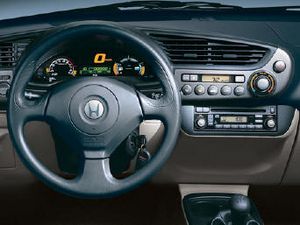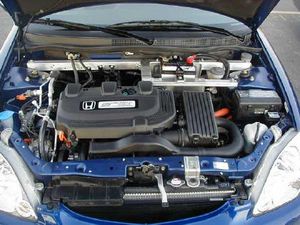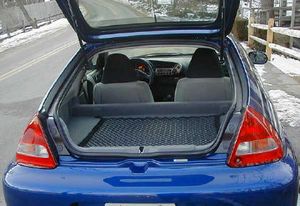.
Honda Insight: Difference between revisions
No edit summary |
|||
| Line 253: | Line 253: | ||
* [http://www.MixedPower.com MixedPower.com] | * [http://www.MixedPower.com MixedPower.com] | ||
* [http://www.insightcentral.org InsightCentral.org: The Independent Honda Insight Website] | * [http://www.insightcentral.org InsightCentral.org: The Independent Honda Insight Website] | ||
Revision as of 20:21, 17 July 2006
The Honda Insight is a 2-seat hatchback hybrid automobile manufactured by Honda. It was the first mass-produced hybrid automobile sold in the United States, introduced in 1999 (in Japan, however, the first generation of the Toyota Prius was launched in 1997). According to the EPA, the 5-speed manual transmission variant of the Insight is the most fuel-efficient mass-produced automobile sold in the United States. The Insight is also one of the cleanest: the CARB rated the 5-speed variant ULEV and the CVT variant SULEV. This trade off is due to the 5-speed's lean-burn ability which increases efficiency at the expense of slightly higher NOx emissions.
Developed from the original J-VX design study, it was introduced for the 1999 model year. Honda has announced that production of the Insight will end in September 2006. A new hybrid model, a car smaller and less expensive than the Civic is slated for release in 2009.
The Insight pairs a three-cylinder gasoline engine with a brushless electric motor located on the crankshaft. Behind the driver's and the passenger's seats there is a set of 144 V NiMH batteries. Under heavy acceleration, the electric motor provides additional power while during deceleration, the motor acts as a generator and recharges the batteries using a process called regenerative braking. A computer control module regulates how much power comes from the internal combustion engine and electric motor, to find the optimal combination of power or effeciency from the driver inputs. The current battery charge is shown on the dashboard, as is the instantaneous fuel efficiency and current state of the electric motor, whether it is assisting the engine or charging the batteries.
While the emphasis has been clearly placed on economy, Honda engineers have still managed to make the Insight pleasant to drive. Many new car reviewers have glossed over the lively steering and precise 'snap and click' gear lever offered in the 5-speed manual trim. The narrow low-rolling-resistance P165/65 R14 78S tires aid toward meeting the economy objective, while also exhibiting excellent ride quality characteristics.
See WikiCars' comprehensive Honda Insight Review.
Recent Changes
The Insight is nearing the end of its design life cycle. Come September 2006, it will no longer be in production.
Styles and Major Options
Two seat front wheel drive hatchback
- 1.0 Liter 3-Cylinder Engine with Integrated Motor Assist, producing 73-horsepower.
- Idle stop feature
- Front wheel drive
- Available Continuously Variable Transmission (CVT).
Options
- Air Conditioning (available with manual transmission).
- Automatic Climate Control (included with Continuously Variable Transmission (CVT)).
- Security System
- In-Dash 6-Disc CD Changer
Pricing
The Insight retails for MSRP $19,330 and carries a $550 delivery fee, giving it a base price of $19,880. The U.S. Federal Income Tax Credit is $1,460 for CVT models purchased prior to December 31, 2010.
|
Trim |
|
|
3-cylinder Manual |
3-cylinder CVT |
|
Price |
|
|
MSRP |
|
|
$19,330 |
$21,530 |
|
Invoice |
|
|
$18,072 |
$20,123 |
Gas Mileage
The Insight can attain an EPA rating of 60 MPG City and 66 MPG Highway when equiped with the 5-speed manual transmission. Actual mileage may vary. Some owners have seen averages of 54.7 MPG with their Honda Insight CVT and 63.2 MPG with the Honda Insight 2WD Manual.
|
Trim |
|
|
3-cylinder Manual |
3-cylinder CVT |
|
Engine |
|
|
1.0L SOHC VTEC |
1.0L SOHC VTEC |
|
MPG (City/Highway) |
|
|
60/66 |
57/56 |
Reliability
Safety
- Anti-Lock Brake System (ABS)
- Dual front air-bags (SRS)
- Front and rear crumple zones
- Front 3-Point safety belts with automatic tensioning system
- 4 Star National Highway Traffic Safety Agency NHTSA crash test rating
Photos
Colors
Exterior
- Navy Blue Pearl
- New Formula Red
- Silverstone Metallic
Interior
Main Competitors
Unique Attributes
The Honda Insight cannot run on its electric motor alone, although it does have the ability to automatically turn off its gasoline engine when the vehicle is at a stop (and restart it upon movement). Since it is more powerful (10 kW) than most starters of conventional cars, the Insight's electric motor can start the engine nearly instantaneously.
Resale Values
Resale values for the Insight appear to be strong as evidenced by the pre-owned prices commanded by dealers and owners selling privately. A combination of low sales volumes and the halo effect of the Honda brand name could be associated with increasing resale values.
|
Year Model |
||||||
|
2006 |
2005 |
2004 |
2003 |
2002 |
2001 |
2000 |
|
Resale Values |
||||||
|
$21,530 |
$19,850 |
$18,225 |
$15,950 |
$13,600 |
$12,025 |
$10,125 |
Design Quirks and Oddities
The stand alone two-seater hatchback hybrid offered in the North American market, the Insight offers a certain exclusiveness. The narrow rear track of the car gives it a unique teardrop silhouette.
Criticisms
Having only two seats could turn off prospective green thinking buyers, as this vehicle is a very focused effort from Honda.
Awards
- The Honda Insight was the winner of the IntelliChoice 2006 "Best Overall Value of the Year" in the subcompact class.
- The Insight also had the Highest EPA Fuel Economy Rating in 2005, and was named Best Fuel Economy for 2006 by Kiplinger's.
For a complete list of accolades and honors, visit the official Honda Insight website
Specifications
- Continuously Variable Transmission (CVT) or 5-speed manual transmission
- 1.0L three-cylinder aluminum-alloy gasoline engine with 67 horsepower and 66 lb-ft of torque
- 144V electric motor with 14 horsepower at 3000 rpm
- Regenerative Braking System
- Ni-MH battery pack
- Digital fuel mileage indicator
- Remote entry system
- Immobilizer theft-deterrant system
- Electrically assisted rack-and-pinion steering
- 14" light alloy wheels
- Low Rolling Resistance Tires
- Rear fender skirts and teardrop shape aid to give a low coefficient of aerodynamic drag (Cd) of 0.25
- Heat-rejecting green-tinted glass
Current Generation: (2000–2006)
The Insight is very much the culmination of earlier design studies and engineering test mule vehicle experiments. The design is very much renascent of the J-VX Concept Study of 1997, combined with Honda's research into electric propulsion, which resulted in the development of the EV Plus. A lease program was first launched in Japan in 1997 and followed in the United States for 1999 with 300 units offered. The EV Plus battery pack technology has been revised into the Integrated Motor Assist powertrain you see today. It is the marriage of the Nickel Metal Hydride batteries used in the EV Plus study, coupled to the a revised version of the IMA assist first developed for the J-VX study. The IMA powertrain, as introduced with the J-VX, was originally developed with an ultra-capacitor. In the J-VX, this ultra-capacitor was used instead of the Insight's battery pack for energy storage. Concerns over crash test performance prevented this from reaching production however. The ultra-capacitor was in a precarious position inside the J-VX, mounted ahead of the rear axle and very close to the gas tank. In addition, capacitors have an added downside of losing their charge relatively quickly, which would have compromised efficiency in typical everyday traffic scenarios.




